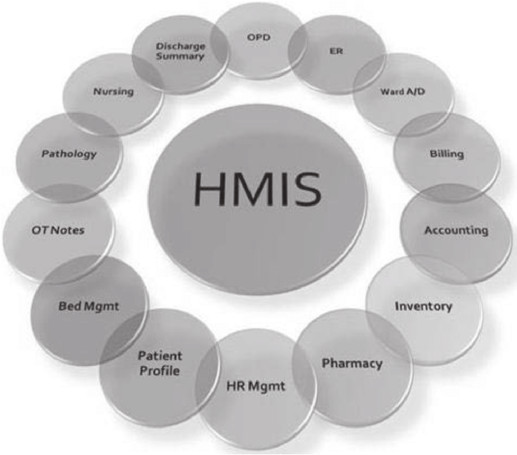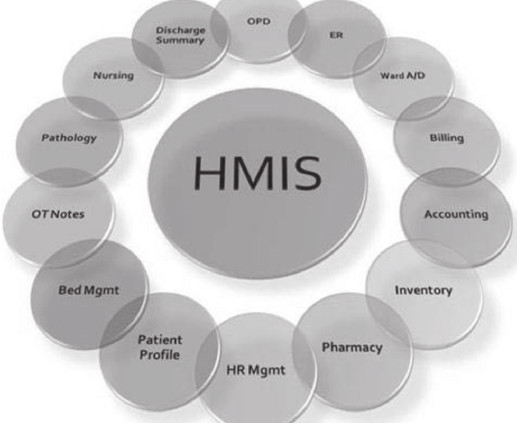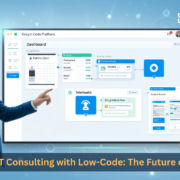The Future of Healthcare Management with HMIS Software
The healthcare industry is undergoing a rapid transformation driven by technological advancements, increased patient expectations, and the need for streamlined administrative processes.
Hospitals and healthcare facilities are constantly seeking innovative solutions to enhance patient care, optimize operational efficiency, and maintain compliance with evolving regulations.
One of the most significant tools enabling this transformation is HMIS Software.By integrating clinical, administrative, and financial functions into a unified platform, this system is shaping the future of healthcare management.

Introduction to Healthcare Management Systems
A hospital management system is defined as a comprehensive digital healthcare platform that is designed to have a hospital’s core operations streamlined and automated. It integrates functions like patient registration, electronic health records (EHR), appointment scheduling, billing, inventory tracking, and data reporting into one centralized system.
By offering real-time access to critical patient information and automating clinical workflows, this healthcare IT solution helps reduce manual tasks and significantly enhances the quality and efficiency of patient care.
Modern HMIS Software goes beyond simple data storage and management. It offers analytics, reporting tools, and decision support systems that empower administrators and medical professionals to make informed decisions quickly. By centralizing data, the software ensures that all stakeholders—from doctors and nurses to administrative staff and management—can access the information they need efficiently.
Streamlining Hospital Operations
Hospital information systems streamline operations by replacing manual processes with automated workflows. Traditional methods often lead to inefficiencies and errors. Integrating advanced systems addresses these issues effectively. This integration enhances efficiency and reduces administrative burdens.
With a modern healthcare management platform, hospitals can automate administrative tasks like patient registration, appointment scheduling, and billing enabling medical staff to focus more on delivering quality patient care rather than managing paperwork.
Inventory management is another critical aspect of hospital operations that benefits from healthcare management software.
The system can monitor supplies in real-time, alerting staff when stock levels are low and ensuring that essential medications and equipment are always available. This not only improves efficiency but also minimizes the risk of shortages that can compromise patient care.
Enhancing Patient Care and Experience
Patient-centered care lies at the heart of modern healthcare. Healthcare management software significantly enhances the patient experience. Integrated electronic medical records provide doctors and nurses with instant access to complete medical histories. Lab results and treatment plans are readily available, facilitating informed, timely, and accurate medical decisions. Consequently, errors are minimized, and health outcomes are improved.
Appointment scheduling modules simplify booking by allowing patients to schedule visits online or via mobile apps. Automated reminders reduce no-show rates, ensuring timely care. Additionally, patient portals enable individuals to securely access test results, treatment updates, and billing information, promoting transparency and engagement in their healthcare journey.
Improving Data Accuracy and Compliance
Accurate and up-to-date information is critical in healthcare, where errors can have serious consequences. The system ensures data accuracy by automating data entry, reducing human error, and maintaining centralized records. This is particularly important for regulatory compliance, as healthcare facilities must adhere to strict standards regarding patient privacy, medical record keeping, and reporting.
The software also facilitates compliance with standards such as HIPAA, GDPR, and local health authority regulations. It provides audit trails, encryption, and role-based access controls to protect sensitive patient information. By ensuring regulatory compliance, hospitals can avoid penalties, maintain trust, and deliver care in a legally secure environment.
Supporting Clinical Decision-Making
Modern HMIS Software goes beyond administrative functions to support clinical decision-making. Advanced systems offer analytics, dashboards, and reporting tools that help physicians analyze patient data, identify trends, and make evidence-based decisions. For example, predictive analytics can identify patients at risk of complications, allowing early interventions that improve outcomes.
Laboratory management modules streamline lab workflows, reduce turnaround times for test results, and ensure that diagnostic information is immediately available to clinicians. Imaging and radiology integration further enhances diagnostic accuracy, providing doctors with detailed, real-time insights into a patient’s condition.
Financial Management and Revenue Optimization
Healthcare facilities face significant financial pressures, including rising operational costs, insurance claims, and reimbursement complexities. HMIS Software addresses these challenges by automating billing, claims processing, and revenue cycle management. Accurate invoicing, integration with insurance providers, and real-time tracking of payments ensure that hospitals can optimize revenue while minimizing errors and delays.
Budgeting and cost management tools within HMIS Software allow administrators to monitor expenditures. analyze resource utilization, and make data-driven financial decisions.
The financial health of healthcare institutions is improved, and resources are ensured to be allocated efficiently to support patient care.
Integration with Emerging Technologies
The future of healthcare management closely ties to emerging technologies such as artificial intelligence (AI), telemedicine, and Internet of Things (IoT) devices. Hospitals are increasingly integrating these technologies with HMIS Software, enabling them to deliver a holistic approach to patient care.. Telemedicine integration allows patients to consult doctors remotely, expanding access to care while maintaining seamless record-keeping within the HMIS system.
Enhancing Hospital Efficiency and Staff Productivity
Hospitals are complex organizations with multiple departments, workflows, and personnel involved in patient care. Advanced management systems simplify coordination between departments, ensuring that information flows seamlessly from admission to discharge. Automated workflows reduce bottlenecks, improve response times, and enhance overall hospital efficiency.
Staff productivity also benefits, as repetitive administrative tasks are automated and staff can focus on critical clinical responsibilities. Time saved on paperwork translates into more direct patient interaction, better patient satisfaction, and improved quality of care.
Scalability and Future-Proofing Healthcare Facilities
As healthcare demands grow and patient volumes increase, scalability becomes increasingly essential. Consequently, modern solutions are designed to grow with healthcare facilities, accommodating additional users, departments, and modules as needed. Moreover, cloud-based systems provide flexibility, remote access, and data security, thereby enabling hospitals to expand services without significant infrastructure investments.
Future-proofing is another advantage. By implementing these systems now, healthcare institutions are prepared to integrate new technologies, adapt to regulatory changes, and respond to evolving patient expectations. Early adoption positions hospitals as leaders in modern, tech-enabled healthcare delivery.
Choosing the Right HMIS Software
Selecting the right system is crucial for achieving these benefits. Healthcare facilities should evaluate solutions based on features, scalability, integration capabilities, user-friendliness, and support services. Systems that provide comprehensive modules covering clinical, administrative, and financial functions are preferable, as they offer a unified platform for end-to-end healthcare management.
Brands like hosval specialize in delivering robust solutions tailored to modern healthcare needs. With a focus on innovation, security, and efficiency, these solutions help hospitals optimize performance while enhancing patient care and satisfaction.
The Future of Healthcare Management
The future of healthcare management is digital, interconnected, and patient-centric.
Hospital Information Management Systems will continue to play a pivotal role in shaping this transformation, enabling hospitals to deliver high-quality care while operating efficiently. Integration with artificial intelligence, telehealth solutions, and IoT-based medical technologies will further expand the capabilities of modern healthcare platforms, creating an ecosystem that is proactive, data-driven, and responsive to patient needs.
By adopting advanced healthcare management systems today, medical institutions not only improve current operations but also invest in a future where they optimize patient care, maximize staff productivity, and enhance hospital administration to be smarter, faster, and more reliable.
Conclusion
Hospital management systems are the cornerstone of modern healthcare administration. They unify clinical, administrative, and financial operations. These systems enhance patient care, improve efficiency, and support regulatory compliance. They also integrate with emerging technologies, helping hospitals thrive in a competitive environment.
Transform your healthcare facility with Hosval’s state-of-the-art HMIS Software. Streamline operations, enhance patient care, and future-proof your system. Invest in innovation and experience next-level healthcare efficiency and excellence.
Get started now—contact Hosval for a personalized demo and see how we can elevate your hospital’s performance!




Leave a Reply
Want to join the discussion?Feel free to contribute!